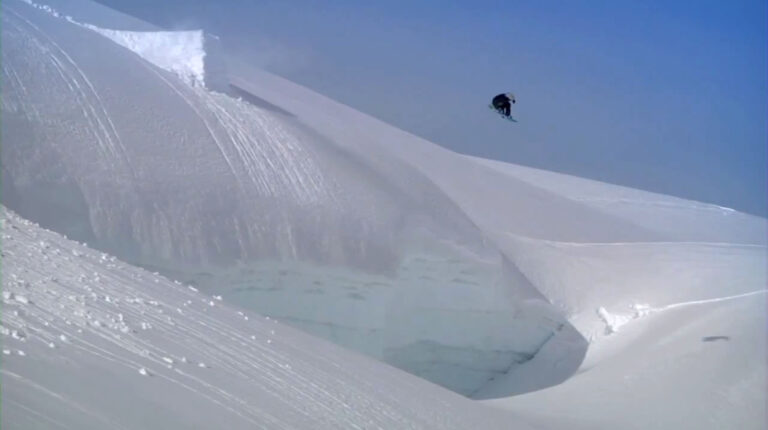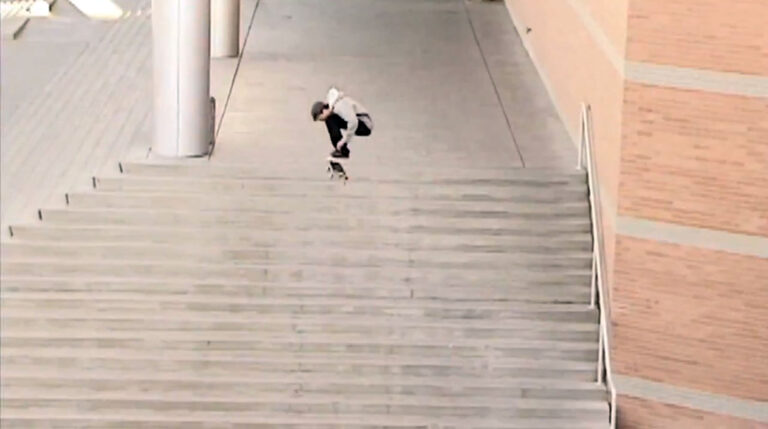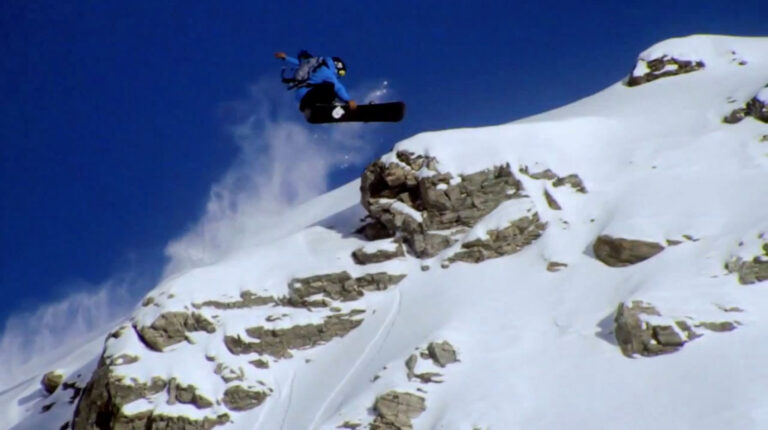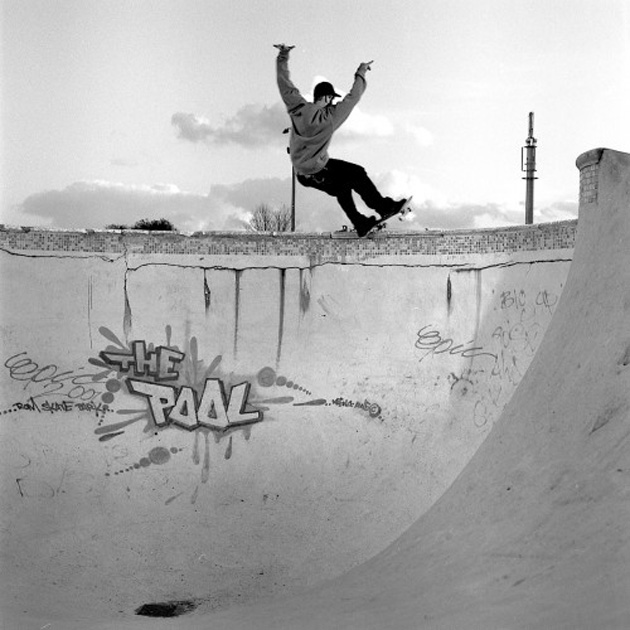Straight-lining, straight-talking and definitely not your average pro – the world’s best freerider tells it how it is.
Words by: Tristan Kennedy
Photos by: Tero Repo
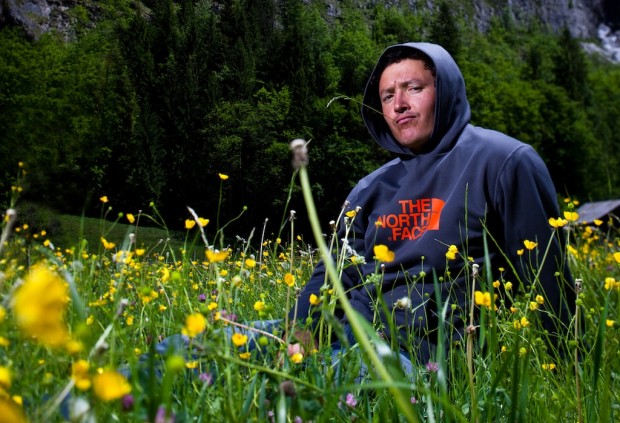
The screen fades up from black, onto a shaky GoPro close-up of a snowy mountainside. There’s no music, and the only sound is the slightly ragged breathing of the rider and the crunch of snow on his snowboard edge. As he shuffles down his voice, surprisingly calm despite the terrifying drop below him, says: “It’s a bit more icy here…” Suddenly the helmet-cam swings violently downwards, there’s a sickening sliding noise and the nose of his board slips away. As he looks back up the slope, the rider’s right arm flies up, and the blade of his an ice axe bites into the blue of the frozen wall in front of his face, stopping his fall. “Fuck” he says in French-accented English, exhaling sharply. You hear his voice crackle over the radio, still surprisingly calm: “I lost my edge there, but I stopped myself. Otherwise I would be dead.”
That scene, on an icy, isolated mountain top, is so far removed from where we are sitting right now that it’s hard to imagine that the man describing it to me is the same Xavier de le Rue who experienced it first-hand. In fact, it would be hard to imagine anywhere that’s further removed from that kind of snowboarding experience than the athletes’ lounge at London’s Freeze Festival, where he’s being hosted by his major sponsor Relentless Energy. We’re surrounded by carefully-styled park rats in the latest snowboard kit – many of whom are not yet out of their teens. Being a pro snowboarder here means sitting around playing Xbox and sipping energy drinks in between brief bursts of activity. Periodically another group of these super-groms heads out the door to be winched up to the top of a scaffold from where they’ll throw a single mind-bogglingly complex trick off a single kicker for the amusement of an inner-city crowd. It’s no wonder that Xavier, a mellow 32-year-old with a shock of curly black hair and a practical-looking fleece over his t-shirt, looks a little out of place in these surroundings. But it’s not just his age or his appearance that sets him apart. Xavier, universally recognised as one of the world’s best freeriders, is a very different kind of pro.
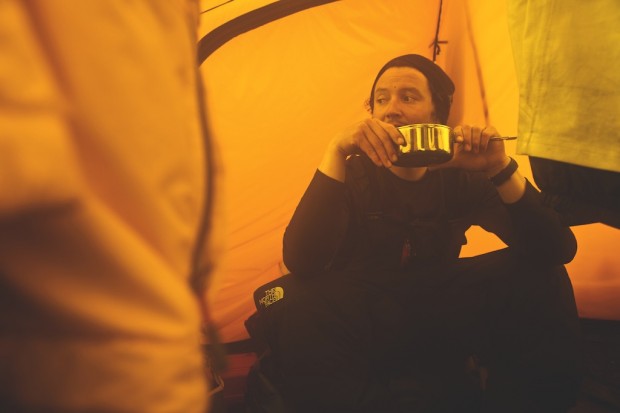
As he tells it, the choice to pursue big mountain riding is something that goes way back. “I was always drawn to freeriding,” he explains. “For me, that is the roots you know? Just riding down a mountain. And at its core, the snowboard is a tool for powder.” But while the love of powder was always there, it was by no means the only string to Xavier’s bow. In fact, his first experience of shredding was hard boot racing. As the son of a sports-shop owner in the French-Pyrenean resort of Saint-Lary, it was perhaps inevitable that Xavier and his siblings would start skiing at a very young age. What was far from inevitable was that, of the five de le Rue brothers, three would forge successful professional snowboard careers. Whatever it was that Madame de le Rue put on her kids’ cornflakes (or rather, baked into their croissants) it must have been pretty powerful!
These days it’s only middle brother Paul-Henri who concentrates on racing (the youngest, Victor, is amongst the freestyle prodigies hurling themselves off the kicker as we talk), but when they first swapped two planks for one, all three de le Rue boys initially kept their hard ski boots. “Back then, it was only hard boots” Xavier explains, “but you know, it gave us kind of good technique”. Xavier found himself entering and winning local races and was soon a fixture on the boardercross circuit. In the early 2000s, he dominated the podium at FIS World Cup events and alongside Paul-Henri he has twice represented France at the Olympics. But despite reaching what for many would be the pinnacle of a sporting career, Xavier wasn’t too fussed about his racing. “For me, the Olympics is two contests before the event [the minimum needed to qualify], and then the Games and that’s it.” His real passion lay elsewhere – by the time he’d competed in his first Olympics, Xavier had moved from the relatively small, snow-poor peaks of the Pyrenees to the powdery paradise that is Chamonix.
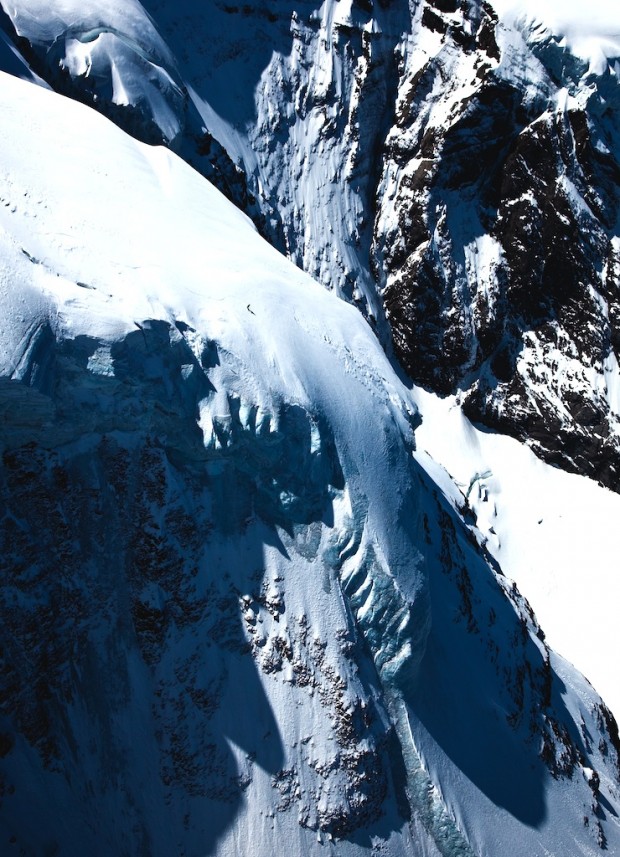
It was here, in the freeride capital of Europe, that he set himself on the path to where he is now. “I learned a lot in Chamonix,” Xavier says, “there is such a crazy scene there”. Like Jeremy Jones, something of a hero to him and the man who would later become his riding partner, Xavier found that the precision turning technique and the love of speed he’d developed from racing made him a natural freerider. “When you are confident and solid in your turns, you can really go at like double the speed!” he says, “and it’s easier when you go faster. You are above the snow, so you touch it less. That means less avalanche risk, and it’s easier to land cliff-drops.”
“Chamonix is a sketchy place, because people think you are only as big as the risks you take. You end up going up and risking your life every day.”
At the same time, Cham gave him a chance to develop his love of climbing, a sport he had discovered at the age of 18, and initially pursued as “a completely separate passion”. He credits his (now ex) wife with helping him really progress. “We did some fucking crazy stuff together. Once we climbed this face in Switzerland, all ice, 800-metres, and it took us 17 hours. And she was a machine you know, I was just following behind her!” But as he explains, “you don’t need a really high mountaineering level to do snowboarding stuff. All the runs that are mellow enough to ride down are pretty easy to climb.” So it wasn’t long before Xavier, like many others in Chamonix, was pushing further and further away from established freeride routes. “People do crazy stuff there, really crazy. At the same time it’s a sketchy place, because people think you are only as big as the risks you take. You end up going up and risking your life every day.” Xavier laughs with a deep, relaxed chuckle, but as anyone who’s spent any time in Chamonix knows he’s not joking. In the end, he explains he decided to move away “for safety reasons”. But not before he had picked up the kind of mountain knowledge that most riders take decades to acquire, and sponsors serious enough to help him make a career out of his true passion.
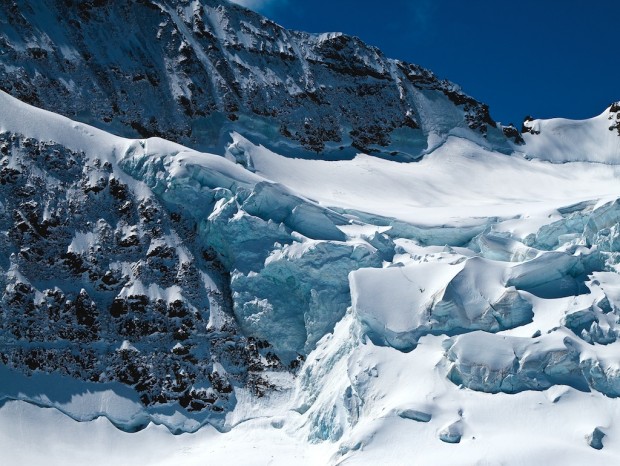
“It’s all about, being at the top of the mountain you know, it feels so beautiful, so powerful, so dangerous and challenging… I don’t know quite how to say it, it’s like this feeling of something bigger.” Xavier says. “To me freestyle is fun, but you’re not in the mountains really. You’re in a controlled area, like a park or whatever.” And it’s making the most of – and mastering – un-controllable natural conditions that really gives Xavier the buzz. “That’s the beauty of freeriding. It’s never guaranteed. It’s like a girl, if you don’t have to work and she’s like: ‘OK fuck me’ from the beginning, it’s too easy, you’re not so into it!” And there’s that laugh again – it’s not sleazy, but it’s the knowing chuckle of a man who you sense might have experienced that situation literally as well as metaphorically.
It’s not that Xavier dislikes freestyle, or freestylers. At one stage in our chat, his brother Victor flops down beside him and introduces himself. Despite the ten-year age difference, it’s obvious the two are close. In fact, he claims he’s “pissed off” that his chosen career path means they don’t ride the same stuff anymore. It’s not like Xavier can’t do freestyle either – his runs occasionally include front threes, little half-cabs and stylish poked out grabs. I ask what he’d do if he had to go up the Freeze kicker with Victor and throw down. “Oh I could ride it, I could do like front seven or something.” But while he admires riders like Travis Rice and Nicolas Muller who take their tricks to the mountain, he feels that focussing purely on freestyle would mean missing out on something bigger. “I always liked freestyle, it’s playful, it’s fucking fun, but you know in the mountains there’s like a greater feeling… I feel like there’s a whole world freestyle riders are not seeing.”
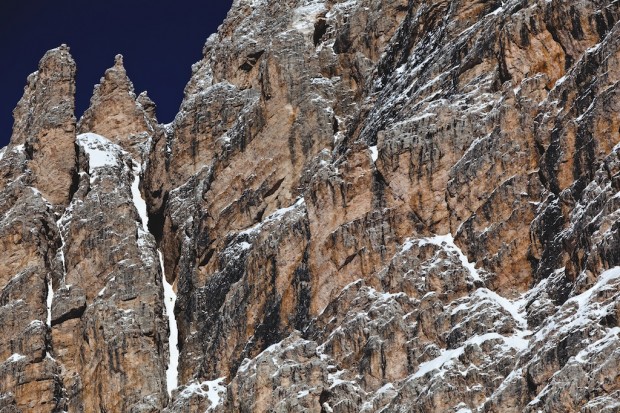
Forging a successful career in freeriding is a notoriously tricky task. It’s no secret that the vast majority of snowboards sold are freestyle sticks. It’s therefore no surprise that the vast majority of snowboard brands’ marketing budgets are spent promoting freestyle, and freestyle riders. It makes sense. Freestyle is an easy sell. It’s visually impressive, it’s easy to get into (there’s no waiting around for the right conditions at Tamworth on a Saturday night) and it’s accessible for spectators and the media. Try dragging 17,000 Relentless Freeze Festival goers halfway up an Alaskan face to watch some freeriding and see how far you get! Taking yourself off into the backcountry means not only removing yourself from the limelight, but also spending less time at the beck and call of team managers and marketing men. There are numerous cases where riders like Johan Olofsson or Victoria Jealouse who’ve decided to concentrate on big mountain riding, have found themselves dropped by sponsors. But then if you compare a three-minute video part to the kind of exposure winning the X Games can give, is it any surprise that marketing departments balk at paying for expensive heli time year after year?
We did some fucking crazy stuff. Once we climbed this face in Switzerland, all ice, 800-metres, and it took us 17 hours
Against this background, it’s impressive that Xavier has managed to maintain a successful career at all. The fact that he’s been a pro freerider for so long is not only testament to his abilities on snow, but also to his ability to keep sponsors happy off it. As he explains “In the autumn I try to make all my sponsors happy. But once it gets to mid-December, forget about it! I’m away in the mountains.” To some people, talking about the pure love of nature, of mountains and of that “greater feeling” might not sit easily with discussions of commercial concerns or promoting Coca Cola Company-owned energy drinks. But Xavier’s not about to deny that that’s a part of his job too. Nor is he going to try and bullshit that somehow there isn’t a bit of a conflict there. “That’s the way the world works right? You can’t help it. I take the benefit of it. I get to live the dream pretty much, so you accept it. I think I’m quite down to earth with these kinds of things. I know that in life not everything comes from the sky.”
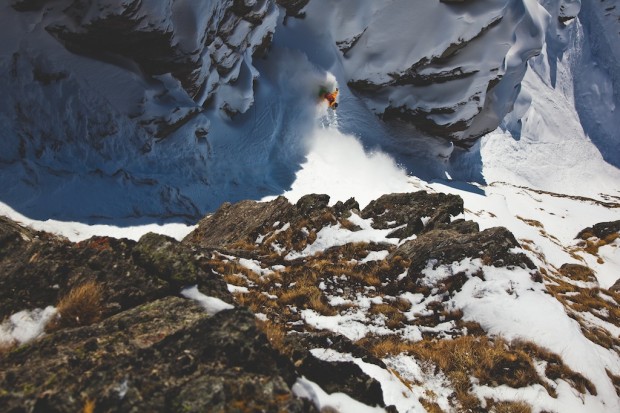
He’s also not about to play the role of the worthy eco-warrior. “There are two ways to see things,” he explains. “One way is that it gives a good message, of course. But I feel a bit hypocritical if it’s me saying it you know? We take planes into the backcountry, we use gear, you know, we promote an industry that sells tons of clothing, that encourages you to change your outfit every year and your board every year. I can say whatever but ultimately I’m still a marketing tool.” When asked about Jeremy Jones’ love of splitboarding as opposed to helicopters, he responds with the kind of frankness that only a man brought up in the spiritual home of the surly waiter could muster. “Fuck, you know… I’ve been doing this one trip with him, and he wants next year for me to go for five weeks in a tent and…pffff” he pulls a funny face that makes me laugh out loud, but he’s not necessarily being rude, just honest. He continues “No seriously, ‘cos I’m calculating, I’ll spend five weeks in a tent and I might get maybe fifteen minutes of snowboarding all together. I’m like, man, it seems right now that Jeremy is more passionate about skinning than riding. I love it, I like those trips, but fucking five weeks…? I’ll just take a heli.” It’s a refreshing change from the American-style bland platitudes delivered by some riders when you stick a Dictaphone in front of them. It’s clear Xavier is no naïve purist, and he’s not about to indulge in the kind of cod-philosophical ‘extreme-sports-dude’ ramblings that too many freeriders seem to come out with.
I always liked freestyle, it’s fucking fun, but I feel like there’s a whole world freestyle riders are not seeing
He’s been happy, for example, to ride in freeride contests down the years. While they may not fit with the cliché of freeriding as the final frontier, they’ve been positive in helping to make freeriding more accessible for a mass audience. Not only is this good for his sponsors, Xavier explains, there are other benefits too. “It’s a great tool to get better. Once or twice during the season you have this one face, you have thirty of the best riders. You ride a line and then you see someone else coming down and you think ‘fuck I didn’t even see that! I didn’t think that would even be possible”. In fact, he reckons the best line he ever rode was during a contest – the final stop of the 2010 Freeride World Tour in his home resort, the Verbier Xtreme. A ridiculously technical top section down the near-vertical Bec des Rosses face leads into a sizeable cliff drop that had never before been attempted in 15 years of the contest. Not only is the run into it stupidly tight, the landing is a steep and narrow and the run out is eye-wateringly fast, skipping between jagged rocks all the way down. It’s probably the most technical line ever tackled on a snowboard, but then Xavier probably technically the best freerider in the world right now. He admits: “Right now I’m getting a bit over the contest circuit. There’s not really that much competition on the snowboard side. Usually I could ride at about 80 percent of my best and still win, which isn’t that challenging.” In anyone else that would sound like bragging, but Xavier has won the tour three times in a row and unless he falls (which is rare) he will pretty much clean up at any event he enters. He’s too modest to ever say so, but watching him ride you get the impression he’s even surpassed his old mentor Jeremy Jones at the top of the freeride tree. “I think Jeremy has got to this stage where he has reached his top level riding wise, and now he’s learning new stuff hiking and splitboarding and he’s concentrating on that,” is all he’ll say on the subject.
Freeriding is all about reading. The riding part is not that much actually
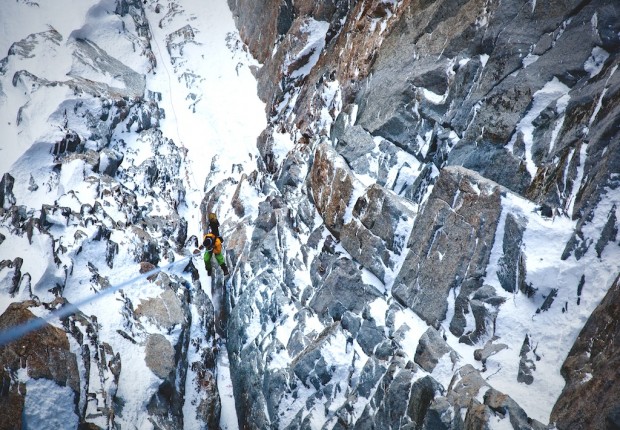
So where does the world’s best look for inspiration? “I know that’s not really the ‘cool’ thing to say, but I’ve was fucking inspired by the skiers on the Freeride World Tour. I remember a few years ago those guys having exactly the same face as you but going way faster and jumping this big stuff. So I started thinking maybe I can try that.” And these days? “My inspiration is trying new stuff. For me there is no point to do the same thing over and over again.” He points to his ride down a wall of sheet ice (which you can see on the cover and the pull-out poster in this magazine) as an example. “It’s been ridden before, but when it’s full of snow – so later in the season. The traditional way to do it is to come and make a belay and abseil down it and then ride again. But I liked the idea that this is doing something different – you know it opens doors, it’s a new way of riding and looking at things.” It certainly makes for a very different, if terrifying-looking, image. Was he sacred? “Well, you go fast, it’s a bit scary, but actually not much can happen if you think about it.” I laugh out loud again in disbelief. This is classic de le Rue – understating the risks and playing down the personal danger. We will later watch his first attempt at the ice-slide, the one he doesn’t tell us about. His edge slips out and he tumbles head over heels for about 50 metres down the near-vertical sheet of ice. OK so he’s largely unhurt, but it’s enough to put anyone else off ever trying anything like it ever again. Xavier, however, hiked right back up there two days later and went for it.
We promote an industry that encourages you to change your outfit and your board every year. I can say whatever about the environment but ultimately I’m still a marketing tool
However, although he’ll he’ll tell you that he loves speed, and “going fast isn’t scary, it’s fucking fun!” after talking to him for a while, you realise Xavier is about as far removed from the cliché of the adrenaline junkie as it’s possible to be. When he’s at home in Verbier and not filming, he likes to relax and take a step back. “I let all the Swedes go in and open up the runs and stuff. I’d rather let some people go before me. I don’t like to play too much you know? I play enough when I’m filming.” But although he describes it as playing, he’s anything but blasé about the risks. “The more you do it, the more you realise that experience is all about thinking it is gonna go wrong. If you plan all the ways it could go wrong then you have that in your head it’s better. You have to have that tension, you have to be thinking about it. You’ve gotta be a bit scared you know?” It’s a lapse of this kind of concentration that Xavier blames for possibly the sacriest thing that’s happened to him yet, the massive avalanche that almost killed him in 2008 [see boxout]. But while he says that the brush with death has made him “super-strict” and meticulous with his planning, it hasn’t stopped him riding. “I think the thing is, with the experience, you allow yourself sometimes to take more risks. When you’re young, you take risks without knowing you take risks. Maybe you’re a bit more crazy, but less experienced. It’s better to be a bit older for freeriding.” After all, as he puts it, “freeriding is all about reading. The riding part is not that much actually”.
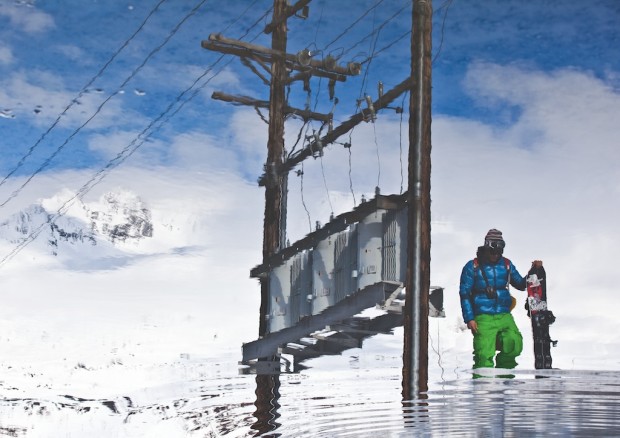
As the PRs come to bring the interview to a close, and take us to an on-site screening of Xavier’s latest film, I find myself wondering whether its his calm, considered demeanour – as much as his incredible board control – that makes him such a good freerider. It’s hard to imagine any of the other young, excitable athletes in the riders’ lounge having the patience required for studying snow conditions and reading the mountain in the way he does. Weaving through crowds of brightly-clad Londoners, smoking, drinking and dancing their way around the festival, Xavier’s type seems worlds apart. He looks embarrassed by the attention as we reach the cinema tent, and accepts the microphone from the PR bloke reluctantly. “OK, so This is My Winter is a film about errr… my winter.” He says softly, to laughter. “I hope you enjoy it.” And then he sits down quickly so as not to impede anyone’s view, his curly black hair disappearing anonymously into the crowd just as the shaky GoPro close-up comes up on the screen…
****************************************************************************************************************
What do you do when your buddy is taken away by a tsunami of snow and you just know that this one is different from all previous ones. He is not escaping, no, this time it’s huge. Everything comes loose, the entire snow face turns into a gigantic puzzle and the mountain pours down over him. You are watching in horror from the heli, using your telephoto lens as binoculars, but he is gone. Then, when you finally you think you got him on your beeper frequency, it turns out to be the heli passing on its own signals. Ten minutes have passed and your search area consists of hundreds of square metres of hard-packed snow. What would you do if you finally find him half a kilometre further down in the forest, in the midst of avalanche gully, totally unconscious, bleeding from ears and nose, with his swollen face half buried and his mouth full of snow? What would you do if he doesn’t give away a whisper over the next 15 minutes, while you keep calling out his name? This is exactly what happened to me. What did I do? I shouted and prayed to Jesus for a miracle in the moment between life and death – and I believe he answered. Protection and safety equipment is all good, but they are also undoubtedly limited! Xavier had all the equipment as he travelled through the mass of hard packed snow, over rocks and through the forest, but I believe it took something more to get him out of that hospital scanner with no signs of injures.
– Christopher Sjostrom, Photographer
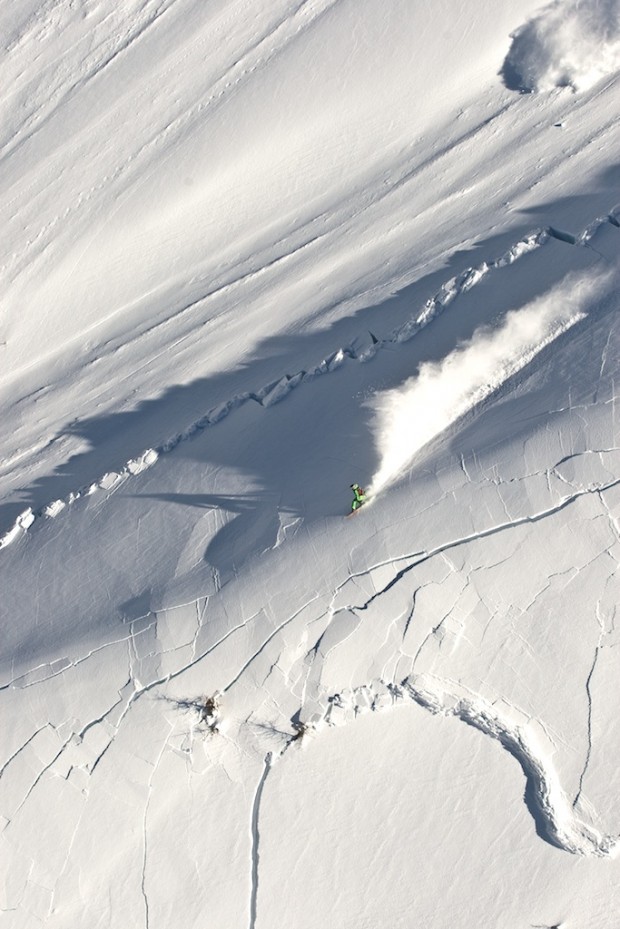
At the end of the day there was this mellow run, and it was like “Oh there’s a nice line there, let’s go and do it”. I remember being stressed because it was being filmed from the heli which is expensive, so I didn’t really look at the run or study it like I normally would. Also because it was a bit more of a mellow run, you’re kind of taking it easy when you shouldn’t. There was this small slab and it broke and I remember panicking and going to the right, not really knowing where I was going. I was just pointing straight down, ‘cos I didn’t have a backup plan. I remember tumbling, but I got out of it, and I was like “woah, that was hectic”, but I thought I was out of trouble. I was basically cruising towards the guide when I saw everything breaking around me, and I was like “what the fuck…” It’s like you’re in the water, in a big wave, and I remember… actually I don’t remember, ‘cos I blacked out.
– Xavier de le Rue


